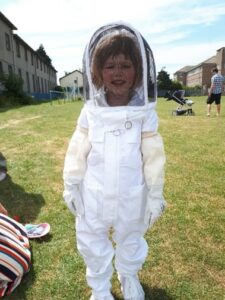Make a ‘beeline’ for the garden on World Bee Day

– By Paula Bradley, Early Childhood Ireland
World Bee Day is taking place on Saturday, 20 May and to celebrate we spoke to Hubert Martin, Gardener and Beekeeper at the WALK Community Garden in Dublin. The garden is funded by WALK with the purpose of promoting community inclusion and developing a programme for people with intellectual disabilities.
A working ecosystem
The gardens started off with a moderately-sized polytunnel full of veg and flowers in the mid-2010s and Hubert soon realised that there was immense opportunity for keeping bees, building his own little circular ecosystem of bee helping flower and flower helping bee. Today he has five hives with over 300,000 bees in residence and his award-winning honey is highly prized.
But these bees and the garden are more than just an ordinary hive. Hubert has made it his mission to provide an environment where people, especially children, can learn about planting, growing and the wildlife that underpins these activities.
The importance of bees
It’s hard to overstate the importance of bees in our world. Bees are crucial pollinators that play an essential role in our world’s ecosystem and food production. They help pollinate a significant portion of our crops, including fruits, vegetables, and nuts, ensuring that these plants produce seeds and fruit. Without bees, many of our favourite foods would become scarce, expensive, or disappear altogether. Additionally, bees also help maintain the biodiversity of our planet, which is critical to the balance and health of our ecosystems.
Bees are an incredible source of learning for children in many ways. Not only do they play a crucial role in pollinating the food we eat, but they also offer an opportunity for children to learn about the importance of nature and the environment. Through observing bees and learning about their behaviour and habitat, children can develop a deeper appreciation and understanding of the interconnectedness of the natural world. Additionally, bees are a fascinating and unique subject of study that can spark curiosity and encourage children to explore science and biology.
First-hand experience

Through his work in the garden, Hubert brings in groups of children and their teachers to learn about the bees first hand. Children as young as 4 or 5 can be safely kitted out in the suits he has specially for children. He takes his time, allowing the children time to explore the garden and become comfortable with the environment, before beginning to discuss bee safety with them. As with any creature, bees can feel threatened by sudden movement. Remaining calm and keeping actions gentle are top of his safety tips.
Once these have been covered, it’s into the bee suits and a trip into the enclosure area where the five hives sit. The sound of the bees grows as you get closer and is quite loud once you’re inside the enclosure. Inside, Hubert shows the children common beekeeper techniques like smoking the hives. The children get to see the internal parts of the hives and see up close how the bees interact with their home.


Encouraging bees in your setting

Learning more
- If you would like to explore the beehives or learn more about the WALK Community Garden, click here.
- The ECI Shop also has a great book called “Look Inside the World of Bees”
- The Irish Wildlife Trust has useful information about planting a bee friendly garden and other information on the All-Ireland Pollination Plan.









